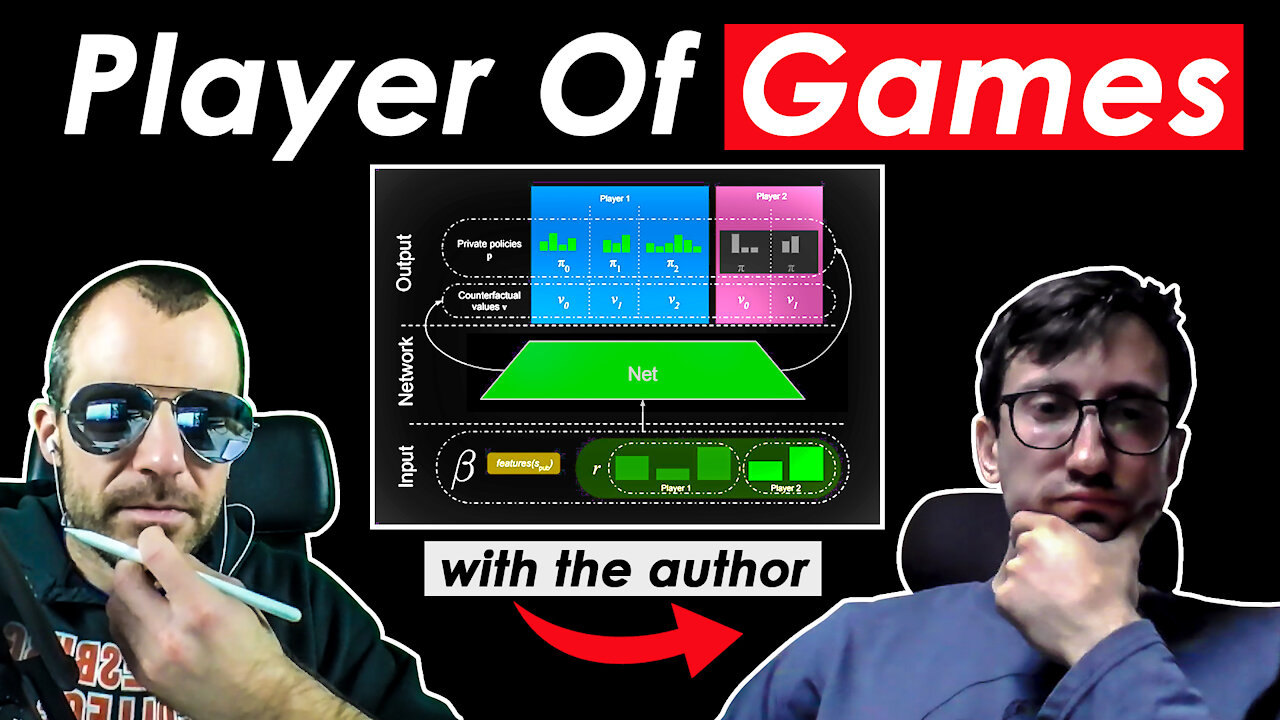Premium Only Content

Player of Games: All the games, one algorithm! (w/ author Martin Schmid)
#playerofgames #deepmind #alphazero
Special Guest: First author Martin Schmid (https://twitter.com/Lifrordi)
Games have been used throughout research as testbeds for AI algorithms, such as reinforcement learning agents. However, different types of games usually require different solution approaches, such as AlphaZero for Go or Chess, and Counterfactual Regret Minimization (CFR) for Poker. Player of Games bridges this gap between perfect and imperfect information games and delivers a single algorithm that uses tree search over public information states, and is trained via self-play. The resulting algorithm can play Go, Chess, Poker, Scotland Yard, and many more games, as well as non-game environments.
OUTLINE:
0:00 - Introduction
2:50 - What games can Player of Games be trained on?
4:00 - Tree search algorithms (AlphaZero)
8:00 - What is different in imperfect information games?
15:40 - Counterfactual Value- and Policy-Networks
18:50 - The Player of Games search procedure
28:30 - How to train the network?
34:40 - Experimental Results
47:20 - Discussion & Outlook
Paper: https://arxiv.org/abs/2112.03178
Abstract:
Games have a long history of serving as a benchmark for progress in artificial intelligence. Recently, approaches using search and learning have shown strong performance across a set of perfect information games, and approaches using game-theoretic reasoning and learning have shown strong performance for specific imperfect information poker variants. We introduce Player of Games, a general-purpose algorithm that unifies previous approaches, combining guided search, self-play learning, and game-theoretic reasoning. Player of Games is the first algorithm to achieve strong empirical performance in large perfect and imperfect information games -- an important step towards truly general algorithms for arbitrary environments. We prove that Player of Games is sound, converging to perfect play as available computation time and approximation capacity increases. Player of Games reaches strong performance in chess and Go, beats the strongest openly available agent in heads-up no-limit Texas hold'em poker (Slumbot), and defeats the state-of-the-art agent in Scotland Yard, an imperfect information game that illustrates the value of guided search, learning, and game-theoretic reasoning.
Authors: Martin Schmid, Matej Moravcik, Neil Burch, Rudolf Kadlec, Josh Davidson, Kevin Waugh, Nolan Bard, Finbarr Timbers, Marc Lanctot, Zach Holland, Elnaz Davoodi, Alden Christianson, Michael Bowling
Links:
TabNine Code Completion (Referral): http://bit.ly/tabnine-yannick
YouTube: https://www.youtube.com/c/yannickilcher
Twitter: https://twitter.com/ykilcher
Discord: https://discord.gg/4H8xxDF
BitChute: https://www.bitchute.com/channel/yann...
LinkedIn: https://www.linkedin.com/in/ykilcher
BiliBili: https://space.bilibili.com/2017636191
If you want to support me, the best thing to do is to share out the content :)
If you want to support me financially (completely optional and voluntary, but a lot of people have asked for this):
SubscribeStar: https://www.subscribestar.com/yannick...
Patreon: https://www.patreon.com/yannickilcher
Bitcoin (BTC): bc1q49lsw3q325tr58ygf8sudx2dqfguclvngvy2cq
Ethereum (ETH): 0x7ad3513E3B8f66799f507Aa7874b1B0eBC7F85e2
Litecoin (LTC): LQW2TRyKYetVC8WjFkhpPhtpbDM4Vw7r9m
Monero (XMR): 4ACL8AGrEo5hAir8A9CeVrW8pEauWvnp1WnSDZxW7tziCDLhZAGsgzhRQABDnFy8yuM9fWJDviJPHKRjV4FWt19CJZN9D4n
-
 23:12
23:12
Jasmin Laine
16 hours agoPoilievre LOSES PATIENCE—His “Who CARES?” Moment SHOCKED Everyone
1.12K17 -
 6:49
6:49
The Car Guy Online
9 hours ago $0.11 earned2025–2026 Duramax FAILURES Begin! GM’s NEW Engine Nightmare? Silverado, Sierra, Yukon...
622 -
 8:34
8:34
Millionaire Mentor
16 hours agoTrump FIRES BACK After Mamdani’s SHOCKING Threat To New York City
1131 -
 1:02:02
1:02:02
A Cigar Hustlers Podcast Every Day
1 day agoEpisode 4 Hustler Every Day Target 10/4, No More Pennies and Gronk Is The Man
191 -
 3:07
3:07
GreenMan Studio
1 day agoHOW TO NOT SELL OUT IN 2025 W/Greeman Reports
865 -
 0:43
0:43
WildCreatures
2 days ago $1.55 earnedDiver is swallowed up by a passing bait ball at Darwin Island
1.17K4 -
 1:54
1:54
Damon Imani
3 days agoDamon Left The View SPEECHLESS on Marriage And Government Overreach
6568 -
 4:09
4:09
Memology 101
13 hours ago"Journalist" REPEATEDLY tries and FAILS to bait John Fetterman into calling Trump an "AUTOCRAT"
47110 -
 58:02
58:02
Dialogue works
2 days ago $3.44 earnedMatthew Hoh: Ukraine’s Army Is COLLAPSING Everywhere!
16.2K11 -
 17:24
17:24
Nate The Lawyer
1 day ago $1.98 earnedBREAKING: NEW Scientific Evidence Shows Men Are Better in Sports Than Women
9.26K12